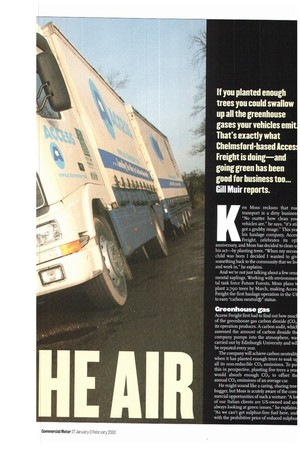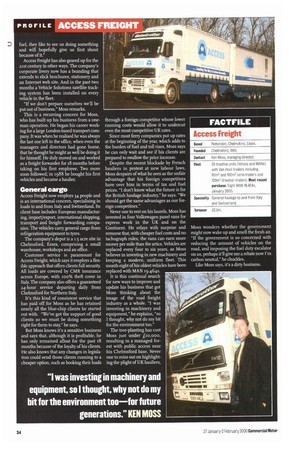If you planted enough trees you could swallow up all
Page 35

Page 36

If you've noticed an error in this article please click here to report it so we can fix it.
the greenhouse gases your vehicles emit That's exactly what Chelmsford-based Acces Freight is doing—and going green has been good for business too... Gill Muir reports.
Ken Moss reckons that r.. transport is a dirty busines "No matter how dean yo vehides are," he says, "it's s i got a grubby image." This ye his haulage company, Acce Freight, celebrates its 15 anniversary, and Moss has decided to clean his act—by planting trees. "When my seco child was born I decided I wanted to gi something back to the community that we li and work in," he explains.
And we're not just talking about a few om mental saplings. Working with environme tal task force Future Forests, Moss plans plant 2,790 trees by March, making Acce Freight the first haulage operation in the U to earn "carbon neutral (D" status.
Greenhouse gas
Access Freight first had to find out how mu. of the greenhouse gas carbon dioxide (CO its operation produces. A carbon audit, whi a assessed the amount of carbon dioxide tl company pumps into the atmosphere, w. carried out by Edinburgh University and ' be repeated every year.
The company will achieve carbon neutrali when it has planted enough trees to soak t. all its non-reducible CO2 emissions. To p this in perspective, planting five trees a ye. would absorb enough CO,, to offset ti annual CO2 emissions of an average car.
He might sound like a caring, sharing tr, hugger, but Moss is acutely aware of the cot mercial opportunities of such a venture: "Al , of our Italian clients are US-owned and a , always looking at green issues," he explain "As we can't get sulphur-free fuel here, a with the prohibitive price of reduced sulpht fuel, they like to see us doing something and will hopefully give us first shout because of it."
Access Freight has also geared up for the arst century in other ways. The company's corporate livery now has a branding that extends to slick brochures, stationery and an Internet web site. And in the past two months a Vehicle Solutions satellite tracking system has been installed on every vehicle in the fleet.
"If we don't prepare ourselves we'll be put out of business," Moss remarks.
This is a recurring concern for Moss, who has built up his business from a oneman operation. He began his career working for a large London-based transport company. It was when he realised he was always the last one left in the office, when even the managers and directors had gone home, that he thought he might as well be doing it for himself. He duly moved on and worked as a freight forwarder for 18 months before taking on his first employee. Two more soon followed; in 1988 he bought his first vehicles and became a haulier.
General cargo
Access Freight now employs 1,4 people and is an international concern, specialising in loads to and from Italy and Switzerland. Its client base includes European manufacturing, import/export, international shipping, transport and freight forwarding companies. The vehicles carry general cargo from refrigeration equipment to tyres.
The company's depot is a 1.5 acre site in Chelmsford, Essex, comprising a small warehouse, workshops and an office.
Customer service is paramount for Access Freight, which says it employs a flexible approach that offers clients full security. All loads are covered by CMR insurance across Europe, with t00% theft cover in Italy. The company also offers a guaranteed 24-hour service departing daily from Chelmsford for Northern Italy.
It's this kind of consistent service that has paid off for Moss as he has retained nearly all the blue-chip clients he started out with. "We've got the support of good clients so we must be doing something right for them to stay," he says.
But Moss knows it's a sensitive business and says that, although it is profitable, he has only remained afloat for the past 18 months because of the loyalty of his clients. He also knows that any changes in legislation could send those clients running to a cheaper option, such as booking their loads through a foreign competitor whose lower running costs would allow it to undercut even the most competitive UK rates.
Since most ferry companies put up rates at the beginning of the year, which adds to the burden of fuel and toll rises, Moss says he can only wait and see if his dients are prepared to swallow the price increase.
Despite the recent blockade by French hauliers in protest at new labour laws. Moss despairs of what he sees as the unfair advantage that his foreign competitors have over him in terms of tax and fuel prices. "I don't know what the future is for the British haulage industry," he says. "We should get the same advantages as our foreign competitors."
Never one to rest on his laurels, Moss has invested in four Volkswagen panel vans for express work in the UK and on the Continent. He relays with surprise and remorse that, with cheaper fuel costs and no tachograph rules, the vans can earn more money per mile than the artics. Vehicles are replaced every four to six years. as Moss believes in investing in new machinery and keeping a modern, uniform fleet. This month eight of his oldest vehicles have been replaced with MAN 19.464s. It is this continual search for new ways to improve and update his business that got Moss thinking about the image of the road freight industry as a whole. "I was investing in machinery and equipment," he explains, "so I thought, why not do my bit for the environment too."
The tree-planting has cost Moss just under Zio,000, resulting in a managed for est with public access near his Chelmsford base. Never one to miss out on highlighting the plight of UK hauliers, Moss wonders whether the government might now wake up and smell the fresh air. "If the government is so concerned with reducing the amount of vehides on the road, and imposing the fuel duty escalator onus, perhaps it'll give me a rebate now I'm carbon neutral," he chuckles.
Like Moss says, it's a dirty business.












































































































